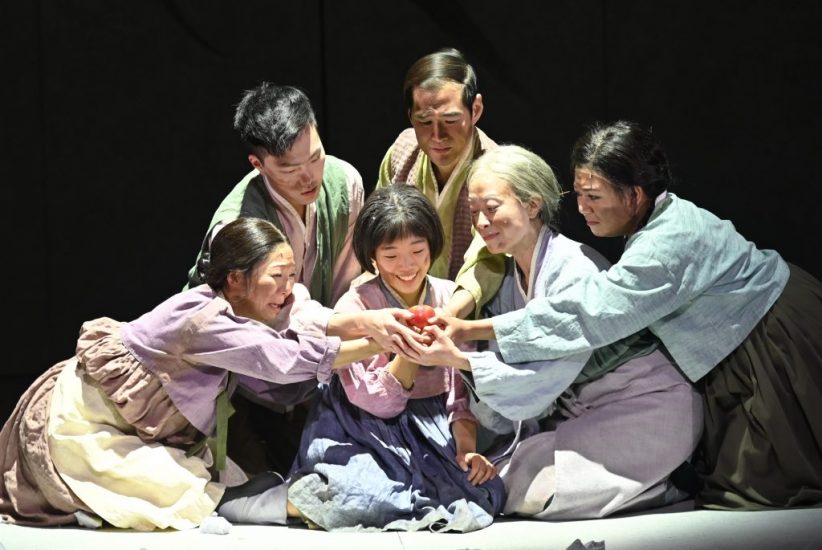A Family Devastated By War: Sun Mee Chomet and Joseph Pendergrast on Performing in ‘Bina’s Six Apples’ Amid the Invasion of Ukraine
When actors Sun Mee Chomet and Joseph Pendergrast first walked on stage to debut “Bina’s Six Apples” at the Children’s Theatre Company in Minneapolis in January, the world was still fighting spiking COVID infections. By the time the 1950 Korea War-set world premiere play opened at the Alliance Theatre on March 16, the real-time invasion of Ukraine by Russian forces had heightened the play’s powerful themes of a family torn apart by war in a country fighting for its very survival.
In both productions, the St. Paul, Minn.-based Chomet plays the stoic and determined mother and also an equally determined and funny merchant in the all-ages production based on real Korean War-era experiences by playwright Lloyd Suh’s father. Atlanta actor Joseph Pendergrast (who has also appeared at the Alliance in “Alice Between” and “Ever After,” the Aurora Theatre’s staging of “In The Heights” and the Actor’s Express production of “Head Over Heels” among others) plays both the older brother Jinsoo and a deserting soldier who befriends Bina. As the title character, a small terrified girl separated from her family after a bomb explodes while escaping to the country’s south, Olivia Lampert is a wonder.
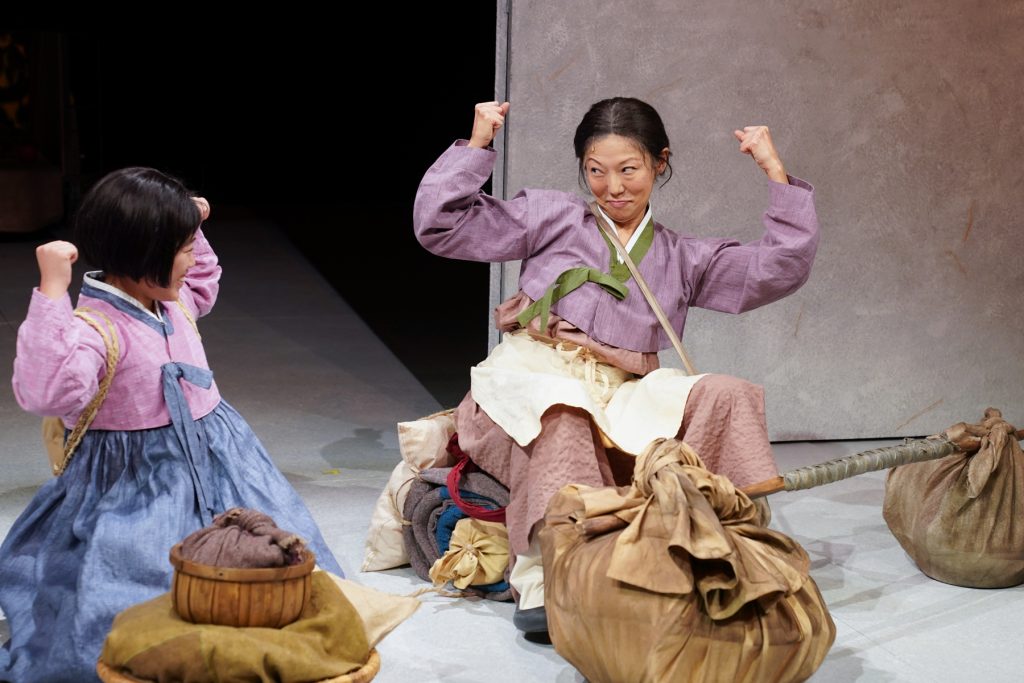
At one point in their poignant portrayal of a young soldier deserting his unit to return home to protect his own little sister, Pendergrast tells Bina, “I’m scared of the bad guys but now I’m scared of the good guys too because I’m not one of them.”
Thanks to a donation from the Zeist Foundation, all Atlanta Public School students and their families have been invited to see the harrowing and heartfelt story for free. The production runs through Sunday live on the Alliance’s Coca-Cola Stage and can be viewed via streaming on the Alliance Theatre website through April 10.
On a recent weekday afternoon, following a student matinee for young audiences, Chomet and Pendergrast talked to Eldredge ATL about creating and refining their four characters on stage in two cities and how the real life war in Ukraine has informed and impacted their stage work.
Q: I saw the opening night performance which happened to be the first anniversary of the Atlanta spa murders. How has that, along with the Ukraine invasion headlines bringing home the current realities of war, influenced your work on stage each night?
Joseph Pendergrast: Both the spa killing anniversary and the war in Ukraine underscored for us the importance of humanizing these characters. A play like this is good for reminding us that refugees and soldiers are not numbers, they’re people. When violence happens on a large scale like this, it affects everyone.
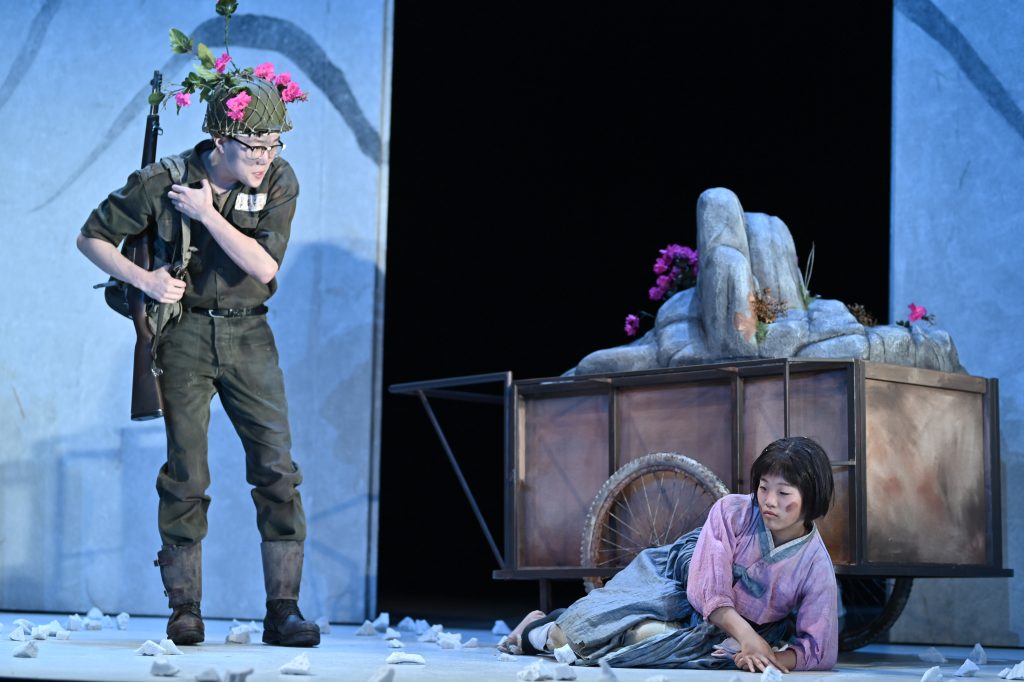
Sun Mee Chomet: It’s interesting to see what a month can do. We opened this in Minnesota and it was about introducing to kids there at the Children’s Theatre Company what it might be like to go through a war. Now, suddenly, it’s in every news headline as we perform it here. We’re tuned into, as Joe said, the civilian impact of this unprovoked war for the Ukrainians. I got particularly choked up one night when I saw they had bombed that theatre in Mariupol. They had written on the sides of the building so it could be seen from the air that children were there. It still gets to me to know that Russia is choosing to bomb maternity hospitals and theatres, civilian life, places where they know there are vulnerable people. It’s heavy, but it tunes the audience in in a way.
Q: Sun Mee, you have some real life parallels to this story. You’re an international adoptee who traveled back to Korea to meet your birth family and then wrote a one-woman show “How to Be a Korean Woman” about that experience. What has telling this story meant for you as an actress?
Sun Mee Chomet: One of the things I learned in the pandemic was when I came back, I wanted to choose work that spoke to my heart. A play like this is rare. I’m adopted and in 2012, I found my birth family. I learned that [during the Korean War] my halmoni, my grandmother walked from North Korea south and she carried on her back, her husband’s first wife’s child because that woman had been killed. This was in addition to taking care of her own children who were walking. My birth mom was conceived in 1950, which was shocking, considering it happened during the war. More than anything, this play is a testament to what they went though. There are about 15,000 Korean transracial adoptions in Minnesota. The entire country of France only had 11,000. It’s more than any other place in the world. For me, even though I didn’t grow up with Korean parents, every Korean person has been affected by the war. Transracial adoptions started in Korea after the Korean War. Even if I didn’t grow up with stories from family members, it’s still part of why I’m here.
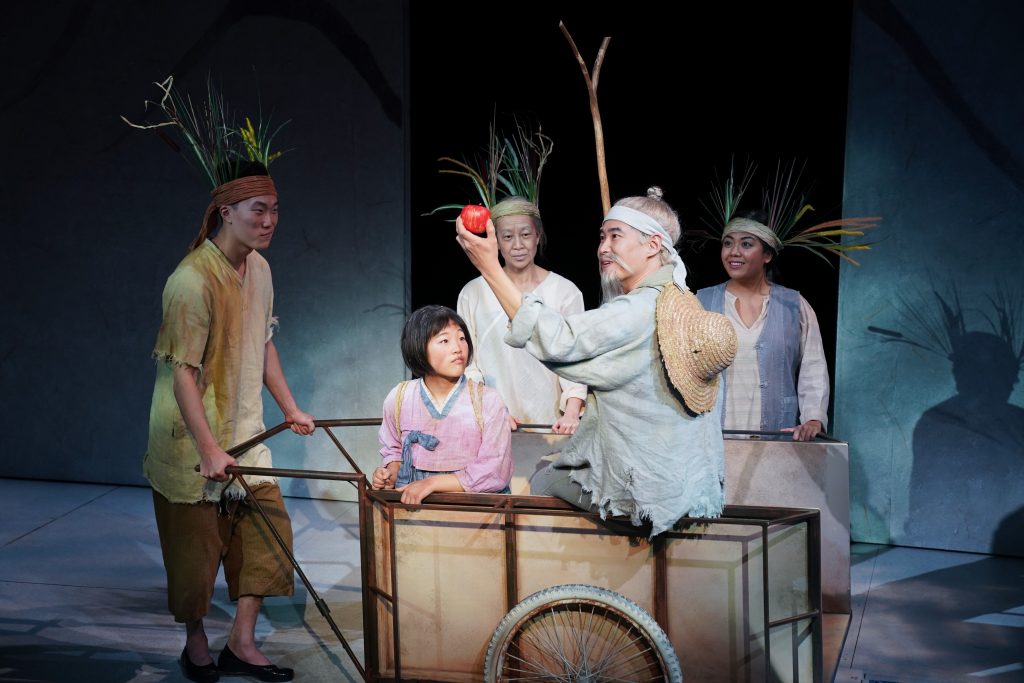
Q: Joseph, you’ve performed in multiple Alliance productions, at Actor’s Express, Synchronicity Theatre, Serenbe Playhouse, and the Aurora Theatre. It would be a shorter conversation to list the Atlanta theatres where you have not performed. In a 2018 AJC interview, you discussed some of the challenges getting good roles as an Asian actor. During the pandemic shutdown and in the aftermath of the murders George Floyd and Ahmaud Arbery and social justice protests, Atlanta’s theatre community began meeting up on Zoom to discuss equity, diversity and inclusion. You’re what directors call a triple threat: you act, sing, dance and can go from drama to comedy. This might be an unfair question since the city’s stages are just now coming out of the pandemic, but have you seen any shifts toward things becoming easier? Do you have reasons to be encouraged?
Joseph Pendergrast: Atlanta casting teams and perhaps casting teams around the nation and the world have demonstrated consistent reluctance to casting Asian actors and any non-white actor in any role that isn’t specifically earmarked for us. The majority of those roles are roles about being that specific flavor of not straight and not white. They’re reluctant to put any Black actor in a role that’s not about being Black and that cannot be cast any other way. That Euro-centric defaultism continues. As you mentioned, there has been a big shift within the working community of actors, artists, stage management, crew and designers around the nation, saying that we’ve kind of had it with that model. The best theatres have done a good job of saying the right things. It remains to be seen if they are willing to be put money and opportunities behind those words. I have not seen it yet.

Q: As we have this conversation, both of you just completed a 10:30 morning matinee for young people. What has it been like to bring this production to young audiences?
Sun Mee Chomet: It’s been fascinating. One of the things [playwright] Lloyd [Suh] and [director] Eric [Ting] have done that’s brilliant is Bina is childrens’ window into the experience so it hooks them. If it was just a bunch of adults talking about war, they wouldn’t necessarily have a stake in it. It would just be an adult thing. But because she’s up there, war is not only the greatest fear for a child and the possibility of losing their family, it’s also the greatest fear for adults to lose their children. It’s just a very compelling story. It’s been cool to talk to parents that have said their children discussed the story all the way home in the car. Olivia is miraculous as an actress. The authenticity and depth she brings to it not only pulls in the adults, children can go on that same ride through her.
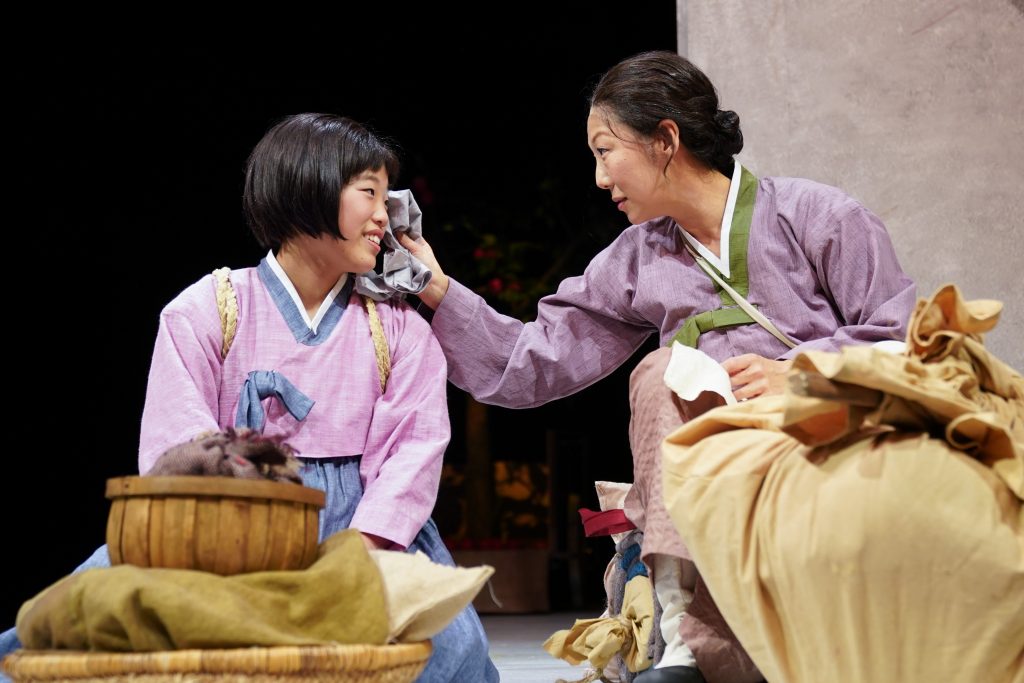
Q: Let’s talk about Olivia Lambert’s performance. Most of this current cast also worked with her in Minneapolis as well. She carries that play for 75 minutes. What’s it been like to work beside her?
Joseph Pendergrast: So, I just answered a question about things about the theatre industry that kind of weigh me down, make me ambivalent about the future and question whether I want to be a part of this industry. One of the things that reignites my passion for theatre and my hope for the future in general is getting to meet and in this case, work with incredible young people like Olivia. Her emotional intelligence, her capacity for empathy and her life skills at applying that empathy in meaningful ways to the people around her is inspirational. She asks us lots of questions and likes to say she’s learning from us. But I distinctly feel the opposite. We’re learning from her every day.
Sun Mee Chomet: She embodies Bina onstage and she embodies Bina offstage. She’s a kind-hearted, heart-led human. They let Chloe [Gia Bremer], her understudy do the show on Tuesday night. And Olivia came back stage afterward crying, saying “I’m so proud of her!” She led the standing ovation for Chloe.
Q: This is a traumatic, emotional story but both of you get to have moments in the script that are lighter, that are funny. What does it mean to get to those lighter moments where you get to take a breath?
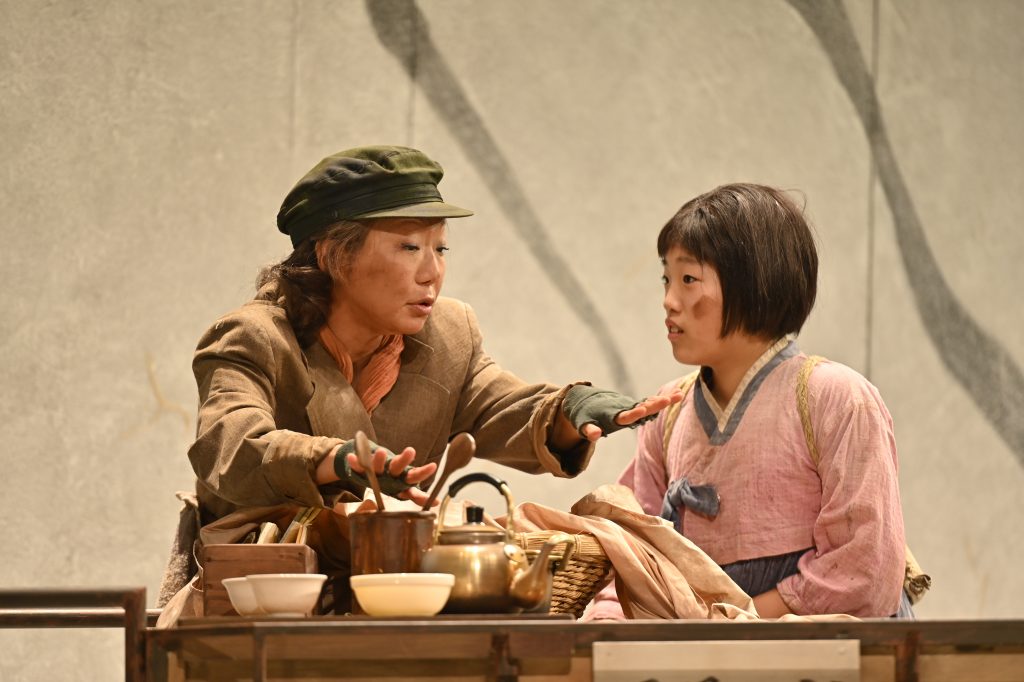
Sun Mee Chomet: We’ve learned over the months doing this that the audience really needs those moments. Bina is living in a brutal world, she’s alone in a war. One of the things I was talking to Joe about the other day was the soldier is one of the only people she meets who is kind to her. He gives her tools. When he teaches her how use the stars to find her way, all of the kids sit forward in their seats because they’re learning something. For me it was fun to incorporate some of the funny things I saw in Korean markets and how those women will haggle with you. The joy and the escape that merchants find in the haggling and the escape they find in the game. To me, it’s an homage to these women who are called ajummas, women who love to haggle.
Joseph Pendergrast: You mentioned that it’s a chance for us to breathe. I think it’s a chance for the audience to breathe also. Our director Eric [Ting] definitely wanted to keep tinkering with the soldier for months, all the way until opening the play here. The first night when he said, “Yes, that’s what I wanted!” was opening night in Atlanta. At the beginning of the rehearsal process, we were trying to honor the circumstances that our characters were existing in. We were interviewing people who had been in or had family affected by the Korean War. We were studying photographs. We were talking about the weight of things. But humor is the best coping mechanism. It was about finding the humor in ridiculous circumstances. For me, it was about taking myself less seriously.
Q: Every cast in every production bonds in some way. Multiple members of this cast, yourselves included, have now done this play in two cities this year against the backdrop of a pandemic and now a war happening in real time. How have these circumstances impacted and bonded you as a company?
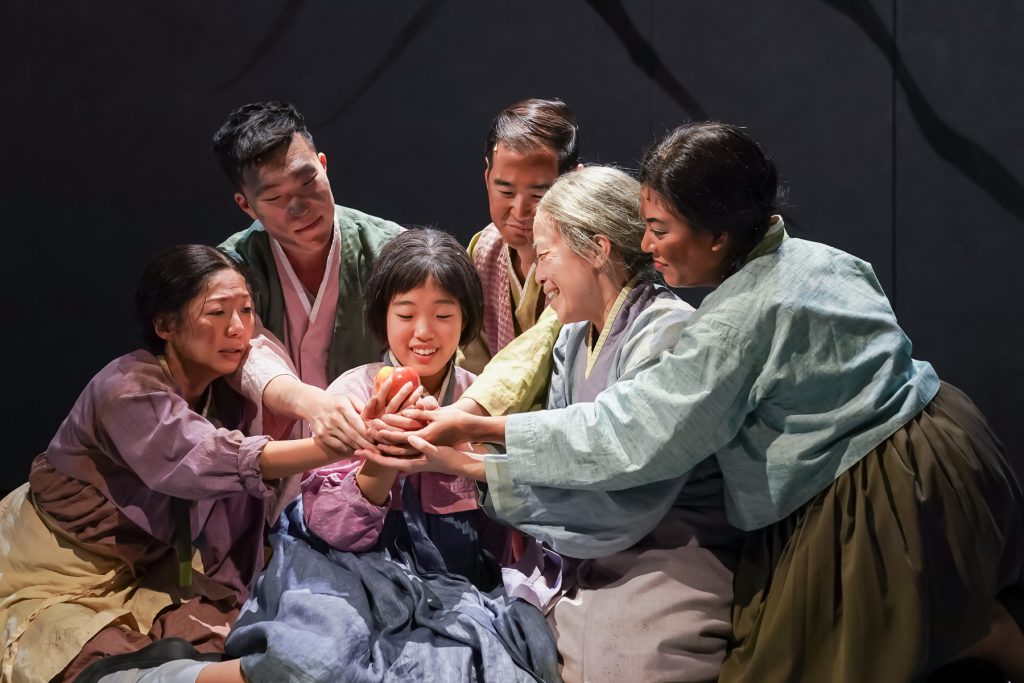
Joseph Pendergrast: For the reasons you’ve stated, along with some others as well, I’ve never bonded with a cast so completely. It now feels like we’re a family playing a family. It doesn’t feel like a stretch at all. We have our arguments and the things we like to tease each other about. But at the end of the day, if for some reason I’m awake at 4 AM and I need someone to talk to, I don’t have to wonder.
Sun Mee Chomet: What’s cool is if you look at the span of our ages, you will probably will ask, “how is this going to work?” It just does. It’s also rare to have the opportunity to work on an Asian-American play. It feels special from day one to look around and see yourself reflected. For the adults in the cast it’s meaningful for us but we also recognize how meaningful it is for the kids to get that experience we didn’t have. Early on, before the war broke out, the play was speaking to the stress kids were experiencing due to the pandemic and how meaningful it was to see us hug and touch at the end. Suddenly, now with the war, it’s taken on a whole other element. Because it’s so rare, doing an Asian-American play together, it makes you feel like a family.
The world premiere of “Bina’s Six Apples,” a co-production of Children’s Theatre Company and the Alliance Theatre runs through Sunday, March 27 on stage at the Coca-Cola Theatre. Alliance patrons at home can continue to stream it via the Alliance website for the next two weeks.

Richard L. Eldredge is the founder and editor in chief of Eldredge ATL. As a reporter for the Atlanta Journal-Constitution and Atlanta magazine, he has covered Atlanta since 1990.

